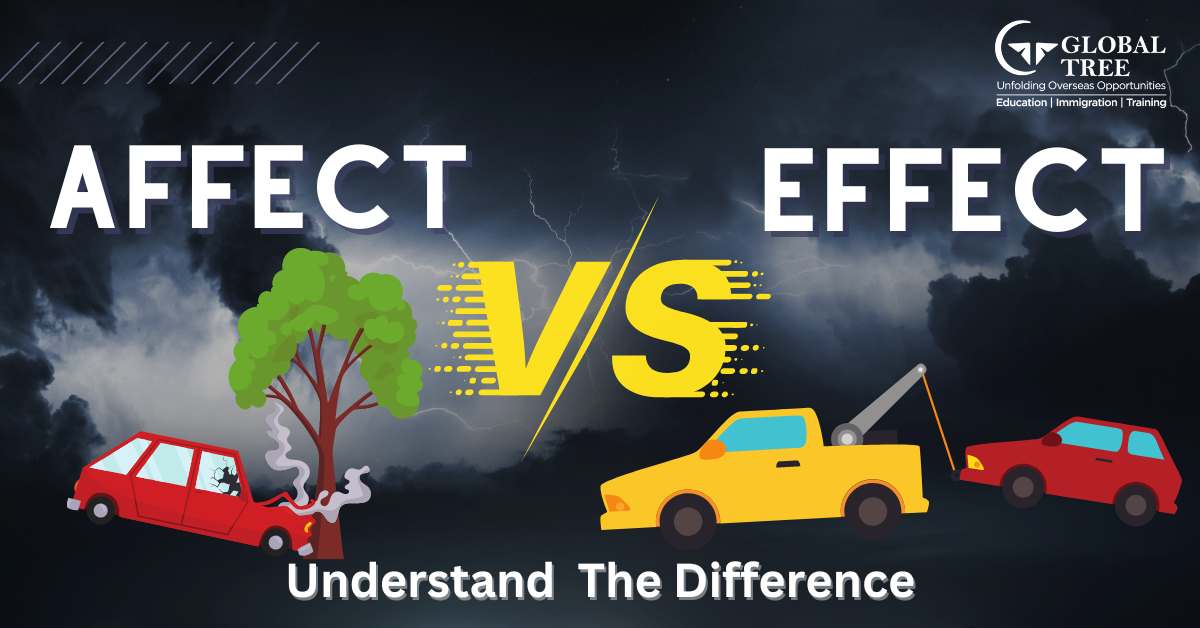Affect vs Effect: Know the difference!

- Introduction
- Effect Or Affect?
- What Does Affect Mean?
- What Does Effect Mean?
- How to Recall Difference between the Terms
- Usage of ‘Affect’
- Usage of ‘Effect’
- Sentences Containing Affect and Effect
- Summary: When To Use Affect And When To Use Effect?
- Following Are Some More Pointers That Will Assist You In Effectively Using Affect and Effect:
- Conclusion
Introduction
Are you getting ready to take the International English Language Testing System test (IELTS) or any other English language proficiency test? When it comes to writing, do you ever find it difficult to choose when to use the words affect and effect? You are not alone! These two terms are frequently mixed up, but in reality, their definitions and applications couldn t be more different.
This blog post is going to present you with some useful hints and suggestions that will assist you in distinguishing between impact and effect.
Effect Or Affect?
Let's get the fundamentals of effect and affect meaning first. Both "affect" and "effect" are considered homophones, which implies that they have the same sound but are used to refer to different things. They are also recognized as a pair of terms that are frequently mixed up by people.
What Does Affect Mean?
To have an effect on something, also known as to affect it, is the meaning of the verb affect. Consider the sentence: "The new policy will have an impact on our budget." The word "affect" is used here to indicate that the new policy will have some kind of effect on the budget. There are also other words like loose and lose that have a vast difference. Learning vocabulary with top synonyms will help in avoiding such confusion.
What Does Effect Mean?
The word "effect" can function both as a verb and a noun. When used as a verb, it indicates to bring about or cause something to occur. As an illustration, you could say something like, "The government hopes to influence reform in the education system." To bring about or bring about change is what is meant by the word effect in this statement.
As used as a noun, effect refers to the final product or fallout of an action. As an illustration, you could say something like, "The new policy had a beneficial influence on the economy." The term 'effect' alludes to the favourable impact that the new policy will have on the economy in the preceding phrase.
How to Recall Difference between the Terms
Use the mnemonic RAVEN to help you keep track of the affect and effect difference:
Remember, Affect Verb Effect Noun
To put it another way, always keep in mind that affect is a verb, whereas effect is a noun. As was said previously, affect can also be employed as a verb; however, you must keep in mind that this usage. Make sure to be aware of the difference as it might confuse you while writing during exams like the IELTS. Be aware of a few IELTS writing tips that will equip you with better knowledge of how to do better.
Consider that the cause of the effect is the affect, and that the effect is the result of the cause. This will help you remember the difference. The difference between affect and effect with examples is that affect is the action, while effect is the result of that action.
Usage of ‘Affect’
Let's have a look at a few different ways to utilise the word impact in sentences:
- Your disposition may change depending on the weather.
- The student's sense of self-worth was impacted as a result of the statements made by the instructor.
- The increase in prices will have an impact on the earnings of the company.
- My ability to concentrate is being negatively impacted by the noise coming from the building site.
In each of these examples, the word "affect" is functioning as a verb to describe the way in which one item is influencing another.
(Read More: What are Figures of Speech and their Examples?)
Usage of ‘Effect’
Now that we have some instances of how to employ affect in phrases, let's have a look at these:
- The effect of the drug could be felt straight away.
- The new legislation is going to have a major impact on the sector of the economy.
- The rebranding effort of the corporation resulted in an increase in revenue.
- The butterfly effect illustrates how seemingly insignificant shifts can have far-reaching consequences.
The word "effect" functions as a noun in each of these sentences, indicating the result or consequence of the action or event being discussed.
Sentences Containing Affect and Effect
Have a look at the following sentences to see how the words affect and effect might be used:
- “Our finances will be impacted by the new policy, but we anticipate that these changes will ultimately be beneficial to our bottom line.”
Affect is used as a verb in this sentence to demonstrate how the impact will be felt on the budget, whilst effect is used as a noun to describe how the positive consequence will be felt on the bottom line.
- “Our ability to travel is being hindered by the weather, and as a result, there is a chance that we will be late for our flight.”
The word "affect" is used as a verb in this sentence to refer to the influence that our inability to fly has, and the word "effect" is used as a noun to refer to the result of our decision to miss our flight.
Summary: When To Use Affect And When To Use Effect?
To summarise, you can show the impact or influence of one item on another by using the verb "affect" to describe the relationship between the two. Whenever you want to show the result or consequence of anything, you can use the word "effect" as a noun. It is important to remember that the word "effect" can also be employed as a verb, meaning "to bring about" or "to cause anything." These are a few cases to remember and memorize them while preparing for IELTS.
Following Are Some More Pointers That Will Assist You In Effectively Using Affect and Effect:
If you are unsure which word to use, consider substituting another word for affect or effect and determining whether or not the statement still makes sense after the change. For instance, if you are unsure whether to use impact or effect in the sentence "The new policy had a positive effect on the economy," you may try replacing the word "effect" with "result": "The new policy had a positive result on the economy." Since this makes sense, you may be sure that the word effect is the one that should be used.
Pay close attention to the setting in which the word is being utilized. There are situations when the surrounding information will make it very evident which term to use. For instance, when someone says, "I was strongly affected by the movie," it is obvious that the word "affect" is the appropriate one to use because it is describing an emotional reaction to the movie.
(Read More: IELTS section-wise tips to crack the exam)
If you want to describe an action or process, you should use the word affect, but if you want to describe a result or consequence, you should use the word effect.
If you are still unsure of the correct word to use, you should check a dictionary or seek the assistance of someone who is fluent in English.
Conclusion
In conclusion, affect and effect are words that are frequently mistaken with one another; but, with little effort and some practice, you will be able to learn how to use these phrases appropriately in your writing. Keep in mind that impact is a verb, while the effect is a noun (although the effect can also be used as a verb), and look to the context of the sentence to help you choose the appropriate word. You will be able to write with self-assurance and clarity by following these IELTS preparation tips by experts exam day.









